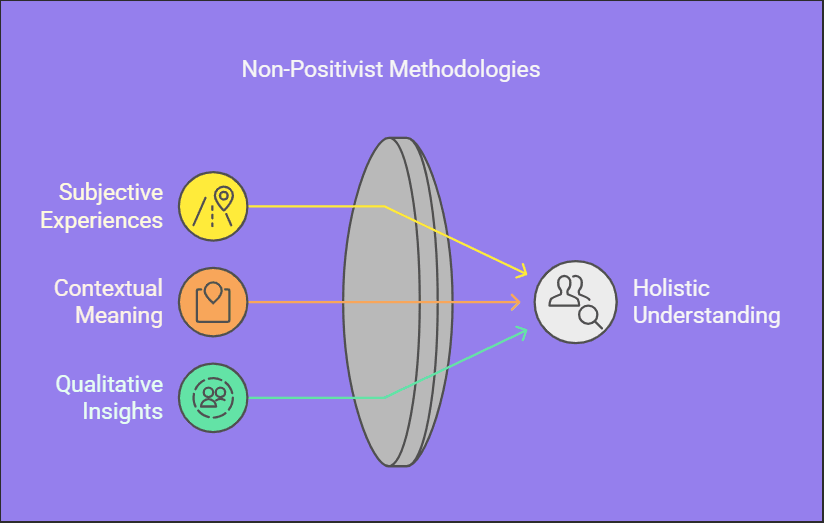Non-Positivist Methodologies
Introduction to Non-Positivist Methodologies
Non-positivist methodologies reject the scientific objectivity and quantitative empiricism of positivism. Instead, they emphasize subjective meanings, socially constructed realities, and interpretive understanding of human behavior. Rooted in anti-positivist philosophies, these approaches prioritize context, agency, and power dynamics.

Key Non-Positivist Approaches
A. Interpretivism (Verstehen)
- Founders: Max Weber, Wilhelm Dilthey.
- Core Idea: Understand social action through the subjective meanings actors attach to their behavior.
- Methods:
- In-depth Interviews: Explore personal narratives (e.g., studying religious conversion).
- Participant Observation: Immerse in social settings (e.g., ethnography of street vendors).
- Example: Weber’s study of the Protestant Ethic linked Calvinist beliefs to capitalist behavior.
B. Phenomenology
- Founders: Alfred Schutz, Edmund Husserl.
- Core Idea: Focus on lived experiences and how individuals perceive their social world.
- Methods:
- Bracketing (Epoché): Suspend preconceptions to grasp pure experience.
- Life-World Analysis: Study everyday routines (e.g., commuting, family meals).
- Example: Schutz’s analysis of “The Stranger” examining migrants’ adaptation.
C. Ethnomethodology
- Founder: Harold Garfinkel.
- Core Idea: Investigate how people create and maintain social order through everyday practices.
- Methods:
- Breaching Experiments: Disrupt norms to reveal hidden rules (e.g., acting like a stranger in one’s home).
- Conversation Analysis: Study dialogue structures (e.g., turn-taking in interviews).
- Example: Garfinkel’s study of gender transitions revealing the social construction of identity.
D. Symbolic Interactionism
- Founders: George Herbert Mead, Herbert Blumer.
- Core Idea: Society emerges from symbolic interactions (language, gestures) that create shared meanings.
- Methods:
- Interaction Analysis: Observe micro-level exchanges (e.g., classroom dynamics).
- Dramaturgy (Goffman): Analyze social life as a theatrical performance (front stage vs. backstage).
- Example: Becker’s “Becoming a Marijuana User” study on learned deviance.
E. Critical Theory
- Founders: Frankfurt School (Adorno, Horkheimer, Habermas).
- Core Idea: Uncover power structures and ideological domination to emancipate marginalized groups.
- Methods:
- Dialectical Analysis: Expose contradictions in capitalist systems.
- Discourse Analysis: Decode media/political narratives (e.g., neoliberal ideology in education).
- Example: Marcuse’s critique of “One-Dimensional Man” in consumerist societies.
F. Feminist Methodologies
- Key Thinkers: Dorothy Smith, Sandra Harding, Patricia Hill Collins.
- Core Idea: Center women’s experiences and challenge patriarchal biases in research.
- Methods:
- Standpoint Theory: Privilege marginalized voices (e.g., Dalit women’s narratives).
- Reflexivity: Acknowledge the researcher’s positionality (e.g., caste/gender of the sociologist).
- Example: Smith’s “The Everyday World as Problematic” highlighting male-dominated institutions.
G. Participatory Action Research (PAR)
- Founder: Paulo Freire.
- Core Idea: Empower communities through collaborative research and social action.
- Methods:
- Community Workshops: Co-design studies with participants (e.g., slum redevelopment plans).
- Photovoice: Use visuals to document marginalized experiences (e.g., tribal land rights).
- Example: Freire’s “Pedagogy of the Oppressed” in Brazilian literacy programs.
H. Postmodern and Poststructuralist Approaches
- Founders: Michel Foucault, Jean-François Lyotard.
- Core Idea: Reject grand narratives and focus on local, fragmented truths.
- Methods:
- Deconstruction: Uncover hidden power in texts (e.g., colonial archives).
- Genealogy: Trace historical shifts in concepts (e.g., Foucault’s History of Sexuality).
- Example: Foucault’s analysis of panopticon in modern surveillance societies.
Key Features of Non-Positivist Methodologies
- Subjectivity: Prioritize participants’ interpretations over objective facts.
- Contextual Understanding: Reject universal laws in favor of situational analysis.
- Qualitative Methods: Use interviews, ethnography, case studies, and focus groups.
- Reflexivity: Acknowledge the researcher’s influence on the study.
- Emancipatory Goals: Aim to challenge inequalities and empower marginalized groups.
Comparison with Positivist Methodologies
| Aspect | Non-Positivist | Positivist |
|---|---|---|
| Ontology | Reality is socially constructed. | Reality is objective and measurable. |
| Epistemology | Knowledge through interpretation. | Knowledge through empirical observation. |
| Methods | Qualitative (interviews, ethnography). | Quantitative (surveys, experiments). |
| Generalization | Context-specific insights. | Universal laws. |
| Role of Values | Values and biases are acknowledged. | Strives for value neutrality. |
Applications in Indian Context
- Caste and Identity:
- Ethnomethodology: Study everyday caste practices (e.g., dining taboos in villages).
- Feminist PAR: Empower Dalit women through participatory land-rights documentation.
- Urban Poverty:
- Symbolic Interactionism: Analyze slum dwellers’ negotiation of stigma.
- Tribal Studies:
- Postcolonial Ethnography: Document indigenous knowledge systems (e.g., Warli art).
Critiques of Non-Positivist Methodologies
- Lack of Generalizability: Findings are often context-bound.
- Subjectivity Bias: Over-reliance on researcher’s interpretation.
- Time-Consuming: Ethnography/PAR requires prolonged engagement.
- Ethical Risks: Breaching experiments may harm participants.
UPSC Answer Framework
Question: “Non-positivist methodologies have enriched sociological inquiry but face significant limitations.” Discuss.
Answer Structure:
- Introduction: Define non-positivism and its philosophical roots.
- Enrichments:
- Depth of qualitative insights (e.g., Geertz’s thick description).
- Empowerment of marginalized voices (feminist/PAR approaches).
- Limitations:
- Subjectivity, ethical concerns, lack of scalability.
- Case Studies:
- M.N. Srinivas’s fieldwork in Coorg (interpretivism).
- B.R. Ambedkar’s Annihilation of Caste (critical theory).
- Conclusion: Advocate for methodological pluralism (mix of positivist/non-positivist methods).
Key Thinkers and Works
- Max Weber: The Protestant Ethic and the Spirit of Capitalism (Interpretivism).
- Dorothy Smith: The Everyday World as Problematic (Feminist Standpoint Theory).
- Michel Foucault: Discipline and Punish (Poststructuralism).
- Paulo Freire: Pedagogy of the Oppressed (PAR).
Flowchart: Non-Positivist Methodologies
Non-Positivism → Focus on Meaning/Subjectivity
↓
Approaches:
→ Interpretivism (Weber)
→ Symbolic Interactionism (Mead)
→ Critical Theory (Adorno)
→ Feminist Methodology (Smith)
↓
Methods:
→ Ethnography, Interviews, PAR
↓
Outcome:
→ Contextual, Emancipatory Knowledge Conclusion
Non-positivist methodologies challenge the hegemony of positivism by centering human agency, cultural contexts, and power dynamics. While they offer profound insights into social realities, their limitations necessitate a balanced approach. For UPSC, emphasize their relevance in studying India’s diverse social fabric, from caste hierarchies to gender inequalities.
Glossary:
- Ontology: Nature of reality.
- Epistemology: Theory of knowledge.
- Reflexivity: Researcher’s awareness of their influence.
- Thick Description: Detailed account of social context (Geertz).